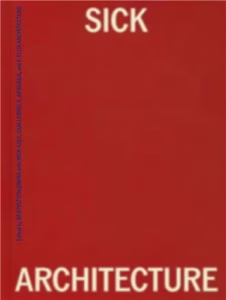Book Review
Publication: Sick Architecture, The MIT Press, 2025
Review Publication Date: Nov 21, 2025, Journal of Medical Humanities
Book Author: by Beatriz Colomina, Nick Axel, and Guillermo S. Arsuaga
Book Review Author: Diana C. Anderson, MD, MArch
View article
Excerpt:
 Having spent my career at the intersection of architecture and medicine, I often reflected on historical timepoints when these junctures were most impactful to human health and sickness. I have repeatedly hoped for a deeper review and analysis of these inter-professional connections. Sick Architecture by Beatriz Colomina, Nick Axel, and Guillermo S. Arsuaga does just this.
Having spent my career at the intersection of architecture and medicine, I often reflected on historical timepoints when these junctures were most impactful to human health and sickness. I have repeatedly hoped for a deeper review and analysis of these inter-professional connections. Sick Architecture by Beatriz Colomina, Nick Axel, and Guillermo S. Arsuaga does just this.
Read more HERE.















